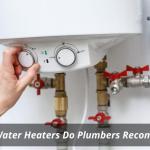
What Water Heaters Do Plumbers Recommend?
When should you replace your old tankless water heater? Is your current model performing well enough? If not, what should you look out for before replacing it? Does hiring plumbing services help to lower the cost of your water bills?
Most homes come equipped with a hot water storage tank or tankless models. There’s no shortage of new options offered today. That said, there are several features you may want to consider before selecting the perfect one for your household.
The following is an overview of some of the key features to keep in mind as you shop around.
The first thing to check is whether your hot water supply comes from a gas or electric main line. Electric supplies are generally more energy efficient than natural gas ones, but either option can be used safely and effectively.
Three types of tanks that can be installed
1. Tankless Hot Water Heater
A tankless unit heats up the water when it flows through its tubing instead of storing it inside a large tank. This type of water heater usually uses less space than other tank-style units while still providing plenty of hot water at a rate of 2 gallons per minute (GPM).
2. Tank Style
For residences with only one bathroom, this style of water heater works well because it doesn’t require any floor space. The heater has a tank where hot water is stored and heated by the incoming cold water. As soon as hot water is needed, the heat from the tank is transferred into incoming cold water so the temperature remains constant throughout the house.
3. Recirculating Tank
This type of water heater has two chambers: a circulation chamber and a storage chamber. Inside the circulation chamber, hot water circulates back and forth between the pipes under pressure and the storage chamber. When hot water reaches the circulation chamber, it goes down to the storage chamber and then returns to the circulation chamber.
The circulating process continues until all the water in the circulation chamber flows into the tank. In addition to being energy-efficient, this type of water heater also saves space since it stores hot water in the same area where it is produced.
How does a tankless water heater differ from a conventional one?
A conventional water heater has a tank with a pump that circulates water through the pipes. To get hot water, you need to turn the faucet on. Once the water passes through the pipes, it’s then pumped over to the tank where it becomes hotter.
In contrast, a tankless water heater heats up the water immediately as it leaves the outlet. It requires special piping and valves to accomplish this task, but these systems save space and reduce energy usage.
Does size matter?
If you have a large family or like to entertain guests often, you will probably prefer a larger-capacity water heater. On the other hand, if you live alone and don’t plan on entertaining very often, a smaller model might be best suited for your needs.
You should always ask about warranties, too. Most manufacturers offer good-quality warranties ranging from 1 to 10 years. You should never assume that a manufacturer is responsible for repairs even though they stand behind their product.
What are some common plumbing problems in hot water systems?
Plumbing issues tend to happen during nighttime hours, particularly in regions with short summers. If you notice an unusual smell coming from your home, there could be several reasons behind it. It may be something minor, such as a clogged drain, or needing a drain cleaner or it could indicate a much bigger plumbing job that you will need to call a plumber.
Here are some things to look out for when dealing with a potential plumbing emergency:
- Unusual odours
- Clogs
- Foul smells
- Leaks / Dripping faucet
- Overflowing kitchen sinks/running toilet
- Puddles
- Slow drains / Blocked drain
- Sprinkler leaks
- Spongy toilets
- Uneven floors
As mentioned before, a few simple troubleshooting steps can help you identify what’s causing the problem. At times, however, the source of the problem may not be obvious. If you experience one of the following symptoms, it means that your water heater could use maintenance assistance or local plumbing service.
- Your hot water runs out quickly (or stops altogether). This indicates that the unit may be malfunctioning.
- Your thermostat shows no change in setting after running the water.
- A strong odour comes from your hot water tap.
- Your hot water tap is slow to respond after turning on.
- Problems arise after leaving the tap open overnight.



